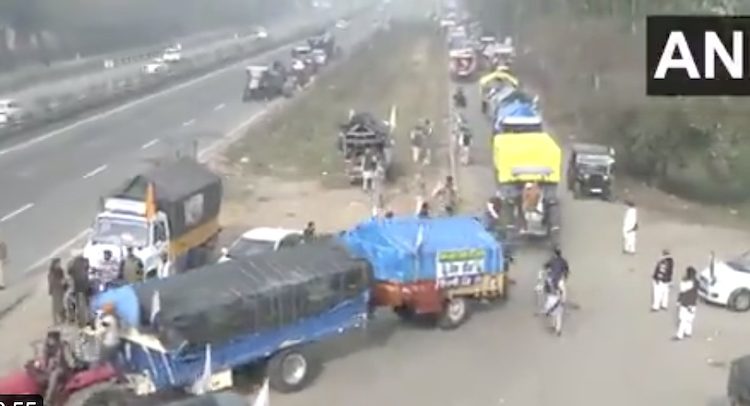New Delhi: The ‘Delhi Chalo’ march by farmers started on Tuesday following an inconclusive meeting with the Union government.
Farmers predominantly from Punjab, joined by counterparts from Haryana and Uttar Pradesh, initiated the march declared last week to press the Centre into acknowledging the farmers’ demands.
According to reports, over 200 unions are participating in the march towards Delhi with their tractor-trolleys stocked with dry provisions, waterproof sheets, and mattresses. The procession towards Delhi is taking place through the Ambala-Shambhu, Khanauri-Jind, and Dabwali borders.
Despite extensive dialogue, the two parties were unable to reach a consensus on critical demands. Nonetheless, the government stated that an agreement was achieved on the majority of issues, and a proposal was made for addressing remaining concerns by establishing a committee.
Sarwan Singh Pandher, the farmer leader, however, said, was pessimistic about the government’s stance. “We do not think the government is serious on any of our demands. We do not think they want to fulfil our demands… Had the government offered anything to us, then we could have reconsidered our agitation,” he told ANI.
The three primary demands which could not be agreed upon were: the enactment of legislation ensuring a Minimum Support Price for all crops, waiving off farmer loan, and the execution of the Swaminathan Commission recommendations.
The Samyukta Kisan Morcha (Non-Political) and the Kisan Mazdoor Morcha will lead Tuesday’s rally. Pandher criticised the extensive barricading along the Punjab and Haryana borders on Tuesday, likening the situation to “international borders.” He also alleged that the government of Manohar Lal Khattar in Haryana was intimidating farmers.
Both Haryana and Delhi have fortified their borders with neighbouring states with concrete barriers, road spikes and barbed wires.
The Delhi Police have implemented various measures to prevent the march from entering Delhi, with a significant police presence observed at the Singhu, Tikri, and Ghazipur borders. A month-long prohibition on public gatherings, as well as the entry of tractors and trolleys into the city, has also been enforced by the authorities.
The Haryana government has additionally imposed Section 144 of the CrPC across 15 districts, forbidding gatherings of five or more individuals and prohibiting any form of demonstration or procession involving tractor trolleys.
More than 50,000 security personnel have been stationed at Delhi’s borders, while internet and bulk SMS services have been halted in seven districts—Ambala, Kurukshetra, Kaithal, Jind, Hisar, Fatehabad, and Sirsa—for Tuesday.
Pandher pointed out that although the media has accused the farmers of road blockages, it is the government itself that has implemented roadblocks. “We grow food grain and we feed the country and they have grown a crop of nails” for us,” Pandher added.
TRAFFIC JAMS
Massive traffic jams were witnessed at the Delhi borders with Gurugram and Noida amid multiple diversions and barricading by police to check vehicles entering the national capital. Long queues of cars were seen on the highways at Ghazipur and Chilla borders, which connect Delhi with Ghaziabad and Noida in Uttar Pradesh.



Comments are closed.